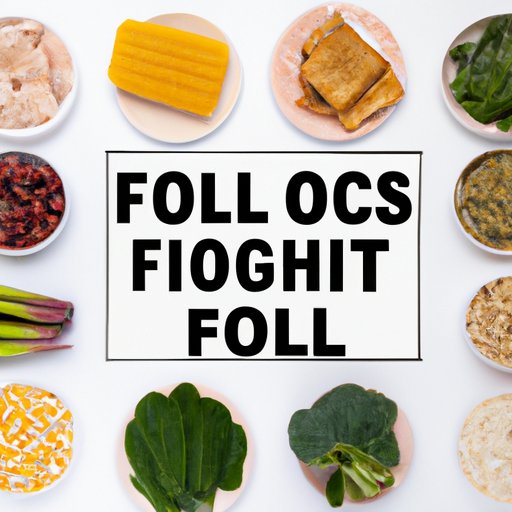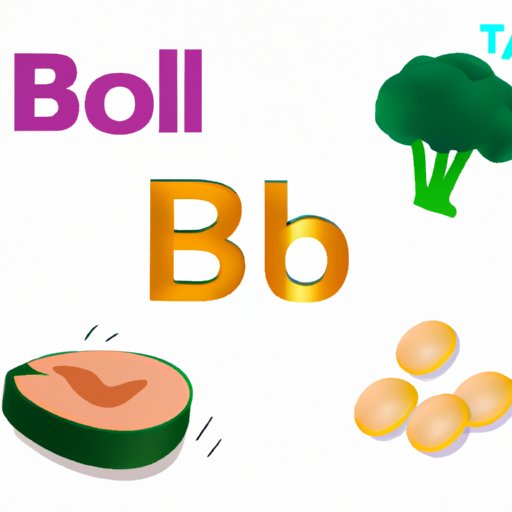The Importance of Vitamin Folate in a Balanced Diet
Vitamin Folate, also known as Vitamin B9, is a crucial nutrient required by the body for the creation and maintenance of new cells. It is a water-soluble vitamin that is naturally present in many different types of foods. Folate is essential for good health, and its intake is particularly critical for pregnant women or those who are trying to conceive. This article seeks to educate readers about the importance of Vitamin Folate in a balanced diet.
Folate plays a significant role in the body. It is required for the formation of DNA, RNA, and red blood cells. It also helps metabolize amino acids and support nerve function. Because the body cannot produce Folate on its own, it is essential to consume an adequate amount of the nutrient through food or supplementation.
The recommended daily intake of Folate varies depending on age and gender. According to the National Institutes of Health (NIH), the daily intake of Folate for men and women over the age of 14 is 400 mcg/day. However, pregnant women and those trying to conceive should aim for a higher intake of 600-800 mcg/day to support fetal growth and development.
Understanding the Role of Folate and its Benefits for Overall Health
Research has shown that Folate can help prevent certain diseases, including birth defects, heart disease, and even cancer. Studies have linked low Folate levels to an increased risk of hypertension, stroke, and cognitive impairment. Consuming an adequate amount of Folate-rich foods or supplements can help lower these risks and promote overall health and well-being.
A lack of Folate in the diet can lead to a deficiency, which can result in a variety of health issues. Common symptoms of Folate deficiency include weakness, fatigue, mouth sores, and a swollen tongue. Long-term Folate deficiency can result in a type of anemia known as megaloblastic anemia. This condition can cause tiredness, shortness of breath, and an increased risk of infections.
Incorporating Folate-rich foods into your diet can help prevent deficiency and provide significant health benefits. Increasing your intake of green leafy vegetables, citrus fruits, beans, and legumes can provide a healthy dose of Folate. Additionally, consuming fortified breakfast cereals and bread made with enriched flour can also help boost Folate intake.
Folate vs Folic Acid: What is the Difference?
Many people use the terms Folate and Folic Acid interchangeably, but they are not the same thing. Folate refers to the naturally occurring form of Vitamin B9 found in food, while Folic Acid is the synthetic form used in dietary supplements.
Although both forms are effective in helping the body produce and maintain new cells, there are differences in how they are absorbed by the body. Folate is more easily absorbed in the small intestine, while Folic Acid must be converted to its active form before it can be utilized by the body.
The debate over whether Folate or Folic Acid is better for the body is ongoing. Some studies suggest that natural Folate is more beneficial than the synthetic form, but there is still much research to be done on the topic. Regardless, both Folate and Folic Acid can provide significant health benefits when consumed in appropriate amounts.

Foods High in Folate: A Comprehensive List to Include in Your Diet
Consuming a well-rounded diet that includes a variety of Folate-rich foods is the most effective way to meet your daily Folate needs. There are several natural food sources of Folate that can be quickly incorporated into your diet.
Leafy green vegetables such as spinach and kale are some of the most Folate-rich foods available. Beans and legumes such as chickpeas and lentils, as well as citrus fruits like oranges and grapefruits, are also excellent sources of Folate. Other vegetable options such as Brussels sprouts, asparagus, and peas, as well as fortified grains and cereals, can also provide a healthy dose of Folate.
It is essential to note that cooking can temper the levels of Folate in foods. Overcooking or boiling vegetables can destroy the Folate levels present in them, while steaming or boiling them lightly can yield the maximum benefits.
How Folate Deficiency Affects Your Body and Ways to Combat It
Folate deficiency can have significant impacts on your health and well-being. It is essential to pay attention to the warning signs and take steps to prevent or combat deficiency.
Effects of Folate deficiency on the body can include anemia, birth defects, and an increased risk of heart disease and stroke. The symptoms of Folate deficiency can be subtle and may not be noticeable at first. Fatigue, weakness, and irritability are common symptoms, as are mouth sores and a swollen tongue. If left untreated, Folate deficiency can lead to more severe health issues, including long-term anemia.
Incorporating Folate-rich foods into your diet is an excellent way to combat Folate deficiency. In some cases, Folate supplements may also be required to address a deficiency effectively. It is essential to speak to a healthcare provider before taking Folate supplements, particularly if pregnant or trying to conceive.
The Link Between Folate and Pregnancy: Why it Matters
Folate plays a crucial role in fetal growth and development, which is why it is particularly important for women to consume adequate amounts of Folate during pregnancy. Studies have shown that Folate supplementation can reduce the risk of birth defects, such as spina bifida or neural tube defects, by up to 70%.
The recommended daily Folate intake for pregnant women or those trying to conceive is 600-800 mcg/day. It is essential to speak to a healthcare provider before beginning Folate supplementation, as too much Folate can also be harmful to the fetus.
Top 5 Supplements for Folate Intake and How to Choose the Right One for You
Folate supplements can be an effective way to ensure that you are meeting your daily Folate needs. There are many different types of Folate supplements available, including Folic Acid and Methylfolate.
The top 5 Folate supplements available include:
1. Nature Made Folic Acid Tablets
2. Solgar Folate 400mcg Tablets
3. Garden of Life Vitamin Code Raw Folate Capsules
4. Thorne Research – 5-MTHF Folate Supplement
5. Pure Encapsulations Folate 400mcg Capsules
When choosing a Folate supplement, it is important to pay attention to the active ingredient, dose, and type of Folate. Those with a Folate or Methylfolate ingredient are recommended as they are more readily absorbed by the body. Additionally, speaking to a healthcare provider before taking supplements is advised.
Conclusion
In conclusion, Vitamin Folate is an essential nutrient that plays a significant role in maintaining good health. Consuming a well-rounded diet that includes a variety of Folate-rich foods, particularly for pregnant women or those looking to conceive, is crucial to meet the daily Folate needs of the body. Understanding the benefits of Folate and how to combat deficiency can help promote overall health and prevent serious health issues.
Overall, prioritizing Folate intake is a small step in ensuring long-term good health.
